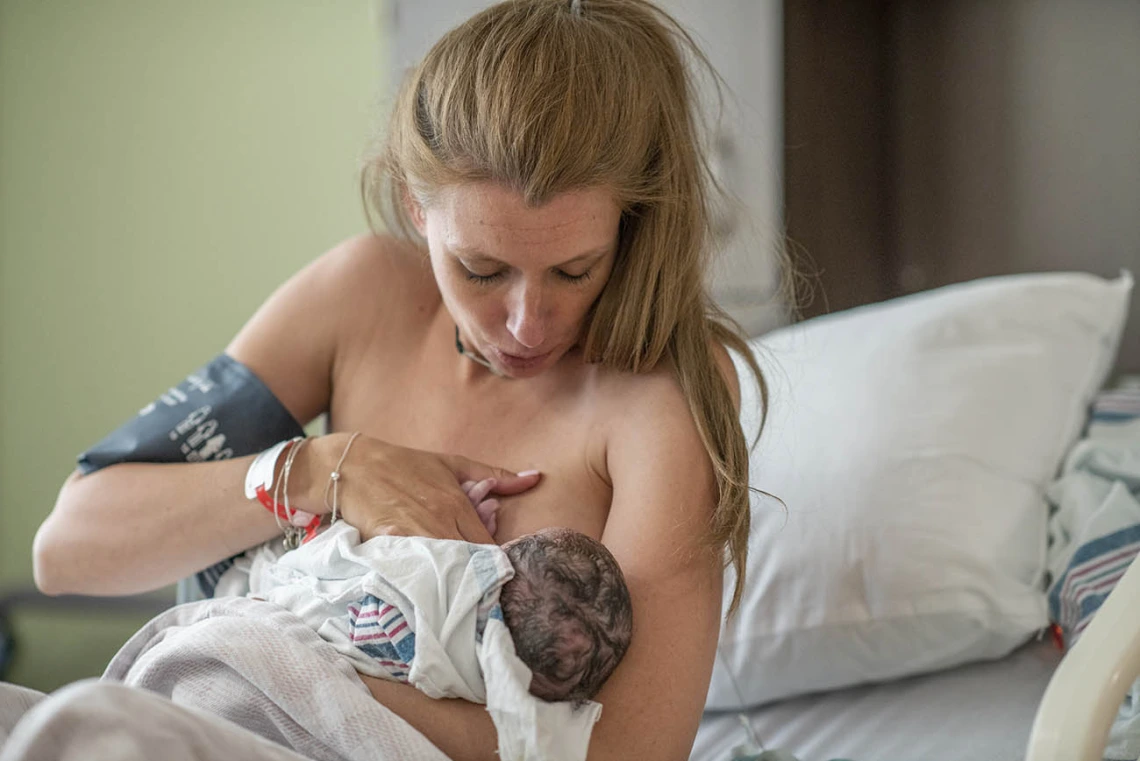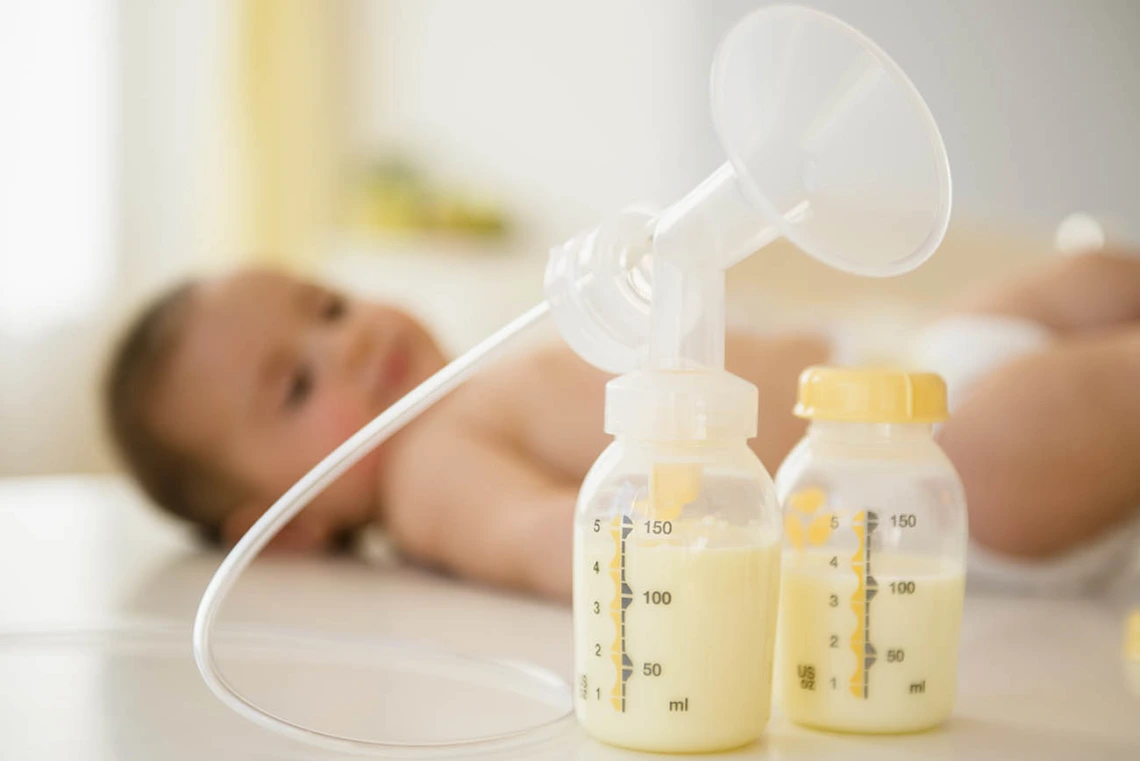Breastfeeding Tips and Support from a Nurse-Scientist Mom
Breast milk acts as medicine, and providing breastfeeding support keeps mothers and babies healthy.

Sheila Gephart, PhD, RN, FAAN first became aware of the importance of breast milk for babies while working in a neonatal intensive care unit. Today, she researches necrotizing enterocolitis(NEC), a serious gastrointestinal problem affecting premature babies. She has found the risk for NEC is six to 12 times higher for babies not fed human milk.
In addition to being a nurse and scientist, Dr. Gephart is a mother who struggled with breastfeeding. Understanding how crucial a mother’s milk can be to her child, Dr. Gephart is passionate about providing accurate information and supporting mothers who breastfeed.
As a nurse-scientist, why is breastfeeding important?
Many people talk about breastfeeding being “best” or “natural,” and it is. Breast milk is more than just nutrition, though. It is a potent immune booster and can act as nature’s best precision medicine for babies.
If you were talking to a mother struggling to breastfeed, what are some of the top things you would want her to know?
Don’t give up. If you need help, it doesn’t mean you have failed. The most important thing is a healthy mom and a healthy baby. Work with your health care team, including lactation consultants and nurses, to get the help you need. If you are early in the process, use your health care benefits to get a double electric breast pump.

After leaving the hospital, breastfeeding support services are available to help mothers, especially in the early weeks. Some resources I recommend are:
- United States Breastfeeding Committee
- U.S. Department of Agriculture’s Women, Infants and Children (WIC) Breastfeeding Support
- La Leche League
- MedLine Plus
Setting a goal and getting support to reach that goal is essential. Breastfeeding resource groups and hospital support groups can help moms overcome unexpected challenges that arise, such as cow’s milk intolerance, growth delays and hormone issues.
Although breastfeeding is natural, it doesn’t always come naturally. Could you explain?
Breastfeeding is a skill that both the mother and the baby get better at over time.

In our highly intervention-driven birthing environment, sometimes the medical care we give can get in the way of promoting breastfeeding. Nurses are great at prioritizing what they call the “golden hour,” where breastfeeding is initiated in that first hour after birth. When the mother and baby are separated because one or the other needs extra care, it makes breastfeeding initiation and sustainment harder.
That said, when specially trained nurses called lactation consultants work with the mother and the baby, they can teach them to overcome these barriers.
Ideally, what should breastfeeding support look like for a family?
- Take a breastfeeding class with your partner before the baby is born.
- Talk with friends and family about breastfeeding before your baby is born so they can support your intention to breastfeed.
- Get help to latch the baby during the “golden hour,” the first hour after birth.
- Feed your baby at the breast every two to three hours, no less than eight times a day.
- Work with nurses and lactation consultants to initiate breastfeeding while in the hospital.
- Schedule a pediatrician visit within three days of discharge for a weight check.
- Attend a weekly breastfeeding support class.
Explain your research and how it relates to breast milk.
I developed a score called GutCheckNEC to provide nurses and physicians with better tools to stay aware of the risk of necrotizing enterocolitis and to communicate their concerns when symptoms arose.
From there our team created NEC-Zero, a bundle for NEC prevention that heavily leans on the importance of providing human milk, especially mom’s own milk or donor milk. When we were developing NEC-Zero, we worked with mothers of infants who had NEC. Some mothers said that no one told them of the risks associated with NEC, while others said that not all the mothers in the newborn intensive care unit were getting the same support to provide human milk.

Breastfeeding can be hard, and it takes help to get started, so support is critical. In the newborn intensive care unit (NICU) environment, mothers rarely start out having the baby feed at the breast because the baby is too weak. Instead, they use an electric breast pump within the first hour after birth and every two to three hours thereafter to get their milk supply going.
My research now focuses on using implementation strategies to help NICU clinicians use the best evidence and technology-based tools to support mothers and their babies.
What’s the most important message for any breastfeeding mothers reading this?
Your milk is medicine and perfectly designed for your baby from the very beginning.
Do all you can to give your baby your milk, even if it means pumping because you are unexpectedly separated. Breastfeeding will be hard, but setting a goal and getting support will help. You can do this!
About the Author
Sheila Gephart, PhD, RN, FAAN, is an Associate Professor and Nurse scientist at the University of Arizona College of Nursing. She began her nursing career working on a neuro unit in 1997, moved to maternal-child nursing in 1999 and to neonatal intensive care in 2001. Her long-term passion has been to improve the quality of care for fragile infants, especially those at risk for necrotizing enterocolitis (also known as “N-E-C” or “NEC”).
Her dissertation work involved the development and testing of a risk score for NEC named GutCheckNEC. She has continued to refine GutCheckNEC and has created a clinical decision support dashboard including it. Her current work combines GutCheckNEC with evidence-based NEC prevention practices. Her team created a toolkit for NEC prevention called the NEC-Zero toolkit. She continues to lead a program of research to improve care quality in the NICU, study of technology-based tools and using dissemination and implementation science. Since 2011 she has served on the Editorial Board for NANN’s journal, Advances in Neonatal Care and currently co-leads the “Evidence-based reviews” section.
She obtained her nursing training and associates degree at Chemeketa Community College in Salem, Oregon; her Bachelor of Science in Nursing from Oregon Health Sciences University in Portland, Oregon; and her PhD in nursing with a minor in health informatics from the University of Arizona in Tucson, Arizona. She was inducted as a Fellow in the American Academy of Nursing in 2019. Her research has been funded by the National Institute of Nursing Research, the Agency for Healthcare Research and Quality, the Robert Wood Johnson Foundation, and the Lawrence B. Emmons fund. She enjoys mentoring doctoral students, cooking, traveling, hiking, and spending time with her family.

